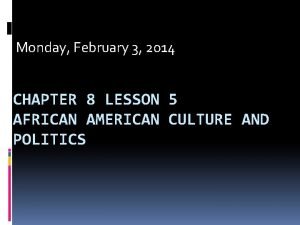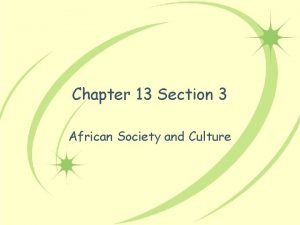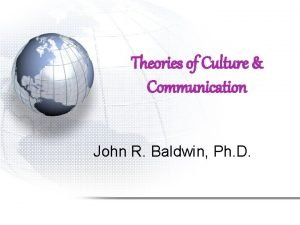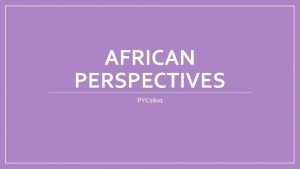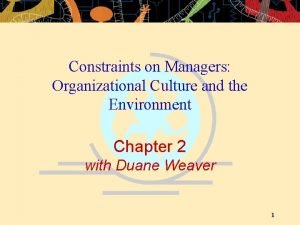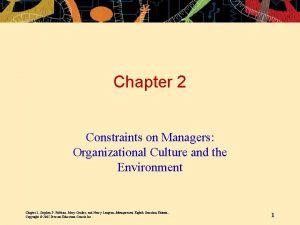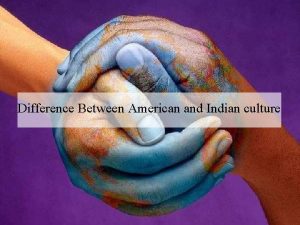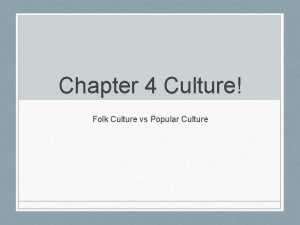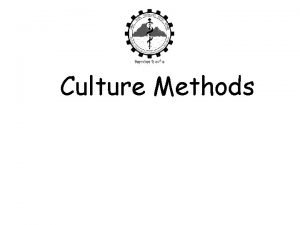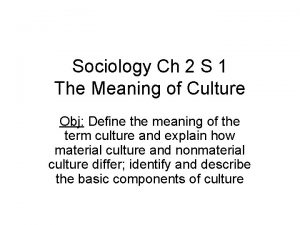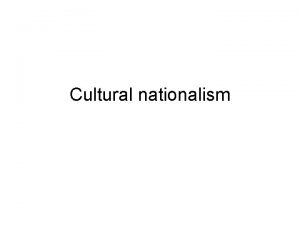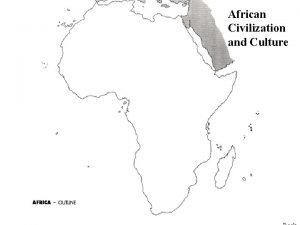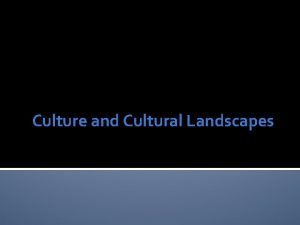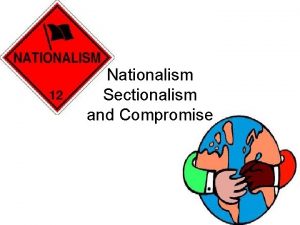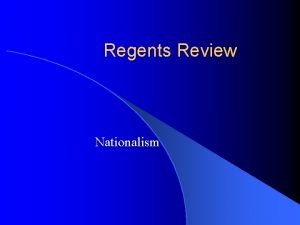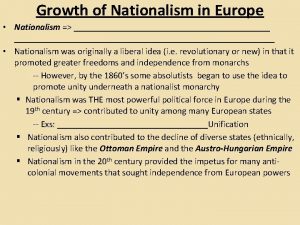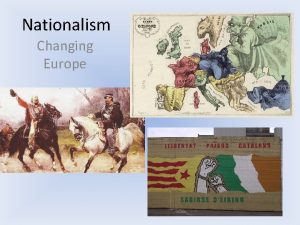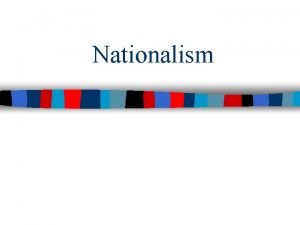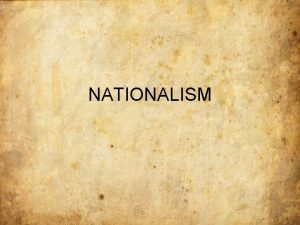Theories of African Nationalism Culture and Nationalism Cultural



















- Slides: 19

Theories of African Nationalism: Culture and Nationalism

Cultural impact of colonialism and Culture Civilizing mission Predominance of Social Darwinism and the inferiority of races Myth about the inferiority of African cultures and societies Demonizing Africans Treatment: violence, punishment, and mutilation because “they” misbehaved “They” were not like “us” and therefore deserved to be ruled Colonial education: European system, languages, and the production of Westernized African elites Assimilation policies Impact of indirect rule: promotion of local leaders

Franz Fanon Born in Martinique in 1925 Went to France as a soldier in W. W. II Studied medicine at the University of Lyon Moved to Algeria and Tunisia as psychiatrist at Bilda-Joinville Hospital Fanon’s experience during the Algerian war of liberation (1954 -1962) He died in 1961 of leukemia in a hospital in Maryland Trained as a psychiatrist, he achieved fame as political theorist who wrote seminal books: Black Skin, White Masks (1952) Wretched of the Earth (1961)


These books addressed the psychological effects of racism and the politics of the Algerian Revolution Despite his short life, Fanon’s observation of colonialism and decolonization had a lasting impact His insights have influenced a wide range of academic fields and political movements Two aspects of his thought: views on violence and national culture

Fanon on National Culture His discussion of national culture, Fanon was mainly concerned with decolonization and post-colonial realities “On national culture” was originally delivered at the Congress of Black Writers and Artists in Rome It forms the central element of his thought on decolonization as a process Fanon defines “national consciousness” as distinct from nationalism Nationalism can be exclusionary on the basis of race, culture, gender, class National consciousness is more inclusive It is rooted in history and popular culture

In Fanon’s view, colonial rule created political and social divisions and conflicting identities National consciousness could become the basis for overcoming these divisions He considers culture as “a special battlefield” Colonial domination disrupts and destroys the cultural life of the conquered people Colonialism “turns to the past of the oppressed people, and distorts, disfigures, and destroyed it” National culture was essential in reversing this condition It helps the colonized people to overcome the inferiority complex

Fanon was initially critical of Negritude’s because of its Romanization of the past However, he later admitted that he too “decided to delve deeper” into the past Delving into the pre-colonial past, will help the colonized psychologically However, national culture must be oriented toward the present and the future If the past is properly utilized it should be employed with the intention of opening the future

The need for creating the conditions for national culture to take hold National culture must be produced during the struggle for liberation, not before, not after “After the struggle is over, there is not only the demise of colonialism, but also the demise of the colonized” National consciousness could lead to a more expansive sensibility

Amilcar Cabral 1924 -1973: Background Born in 1924 in Portuguese Guinea Bissau Studied on the island of Cape Verde and studied agronomy in Lisbon. In 1951 he returned to Guinea as an agronomist Impact of his experience as an agronomist. In 1954 help organize African Party for Independence for Guinea and Cape Verde (PAIGC). He was assassinated by Portuguese agents in 1973, he was 49 years old.


Cabral’s Thought Embraced Marxist philosophy, with flexibility A Revolutionary theory is crucial for national liberation Theory and practice are inextricably linked In view of inherent violence of colonialism, national liberation must adopt armed struggle National liberation is an act of cultural liberation

Impact of Portuguese Rule Impeded the development of indigenous and imposed imperial culture Use the system of assimilacao to produce a class of African Portuguese Indigenato who were demonized and oppressed Two categories: small class of Africans who were considered Portuguese Natives who were exploited The impact of the policy varied from one region to another Preservation of local cultures in remote areas Intensification of assimilation in urban centers who lost their cultural values and history Alienation and confusion

In Cabral’s view reversing this situation is essential National liberation would not succeed without cultural change Cultural change does not mean just a return to the past, but the creation of a new culture Launching this new culture must begin during the anti-colonial struggle Establishment of democratic self-organization in the liberated areas Participating in anti-colonial struggle is a liberating tool Cultural change became the central subject of Cabral’s writings and speeches Syracuse lecture on “national culture” in 1970

History “teaches us that, whatever may be the material aspects of this domination, it can be maintained only by the permanent, organized repression of the cultural life of the people concerned” “In fact, to take up arms to dominate a people is, above all, to take up arms to destroy, or at least to neutralize, to paralyze, its cultural life. For, with a strong indigenous cultural life, foreign domination cannot be sure of its perpetuation. ”

Culture has a material base: it is a reflection of the way in which people make their living “We may consider the national liberation movements as the organized political expression of the culture of the people who are undertaking the struggle. ” The culture of a society is determined by its social structure Societies with horizontal social structure, cultural forms are more less uniform Societies with vertical structure, there are variations from top to the bottom

Colonial rule create mechanisms for cultural repression of the culture of colonized people and to create cultural alimentation Example: assimilation creates a social gap the assimilated elite and the indigenous people The educated elite and other urban dwellers adopt colonial mentality and consider itself culturally superior to rural people The attitude of colonized intellectuals and their claim to privilege For, in the liberation movement as elsewhere, all that glitters is not necessarily gold: political leaders--even the most famous--may be culturally alienated people. Manifestation of this elitism in rural areas among societies with vertical social organization

Need to re-Africanize the national culture Liberation movements must base their action in popular culture: the culture of the rural and urban working masses, and petite bourgeoisie nationalist who were re. Africanized Committing class suicide

Cabral was able to foresee the limits of African nationalism as in the case of British and French colonies It meant replacing the old Western model of nation state that was created by colonial powers At independence, African leaders and nations face stark ideological choice: either capitalism or socialism: “There are only two possible paths for an independent nation: to return to imperialist domination (neo-colonialism, capitalism, state capitalism), or to take the way of socialism”
 Chapter 8 lesson 5 african american culture and politics
Chapter 8 lesson 5 african american culture and politics West african society and culture section 3
West african society and culture section 3 Theories of culture and communication
Theories of culture and communication The rituals to fortify african babies against evil
The rituals to fortify african babies against evil Techniques of tissue culture
Techniques of tissue culture Cultural constraints on managers
Cultural constraints on managers Cultural constraints in management theories
Cultural constraints in management theories Non material culture
Non material culture Continuous culture and batch culture
Continuous culture and batch culture Indian culture vs american culture
Indian culture vs american culture Stroke culture method
Stroke culture method Folk culture and popular culture venn diagram
Folk culture and popular culture venn diagram Folk cultures are spread primarily by
Folk cultures are spread primarily by Anerobic media
Anerobic media Homework due today
Homework due today Anaerobic gaspak
Anaerobic gaspak Describe lawn culture and surface plating
Describe lawn culture and surface plating Surface culture deep culture and esol
Surface culture deep culture and esol Individual culture traits combine to form culture patterns.
Individual culture traits combine to form culture patterns. Batch culture vs continuous culture
Batch culture vs continuous culture
